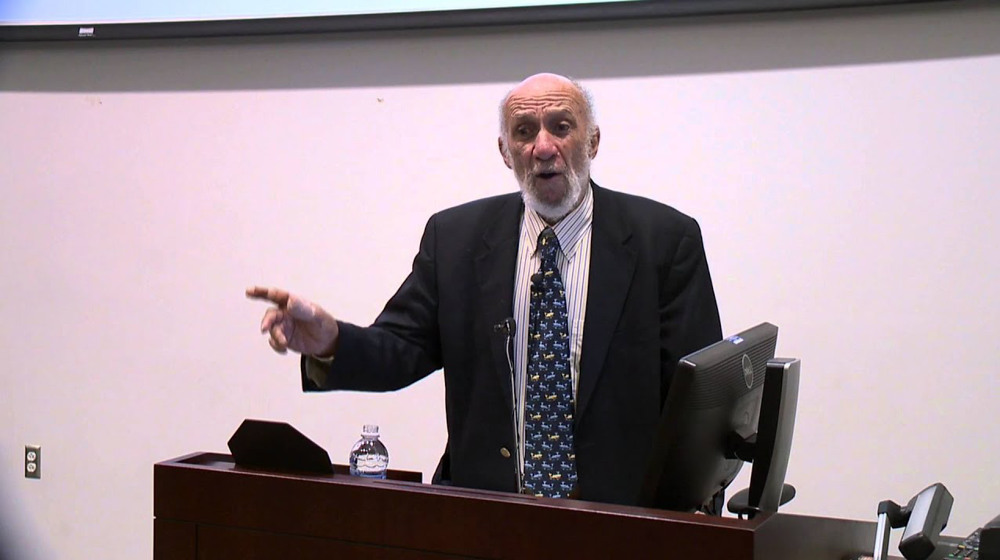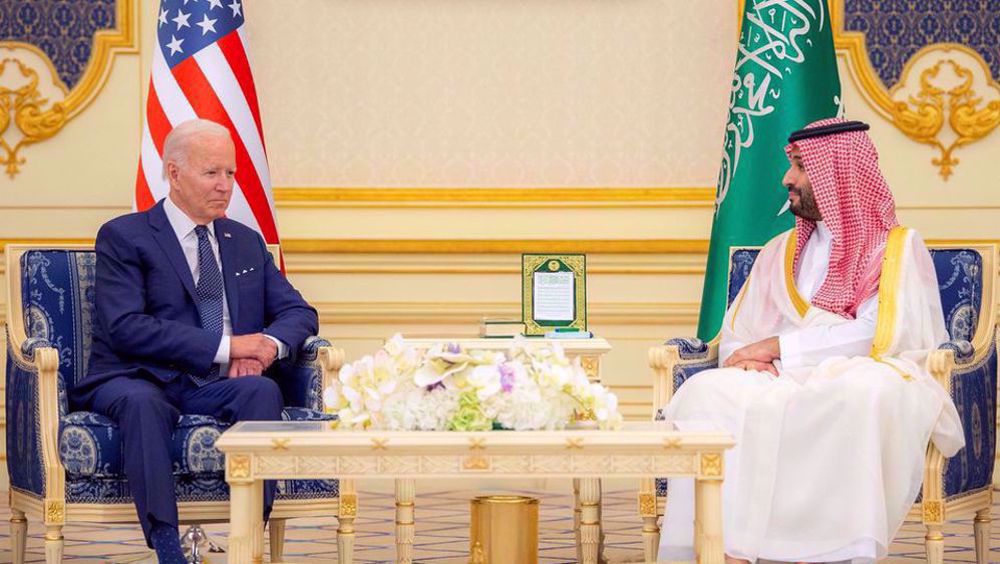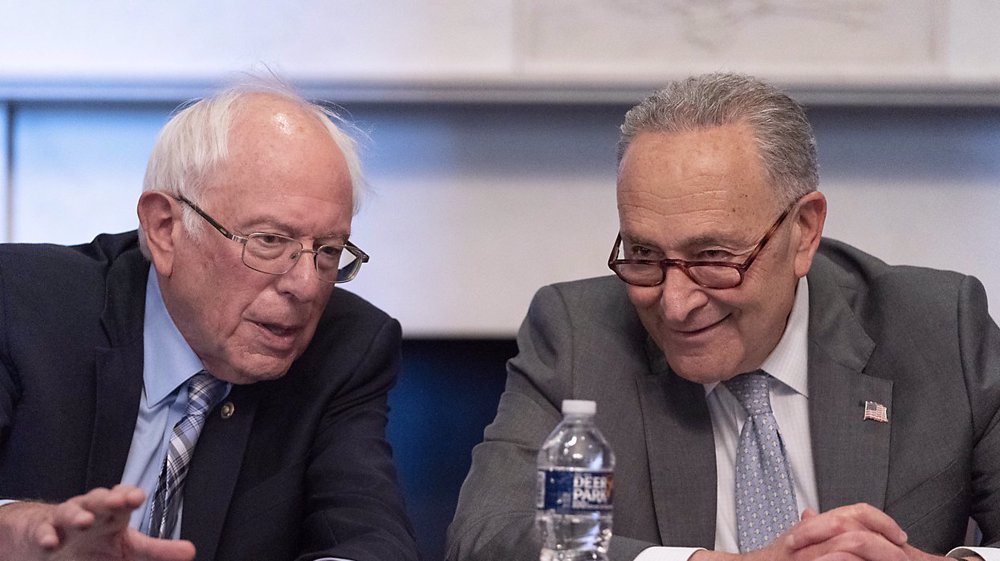Richard Falk: Washington fears Saudi realignment to Russia and China
American academic and political analyst Richard Falk suspected that the foreign policy establishment in Washington is inhibited by the fear that Saudi Arabia might become tempted to shift its alignment in a direction more in line with China and Russia.
Falk made the remarks on Sunday in an exclusive interview with Press TV while commenting on US warnings to Saudi Arabia after the Organization of the Petroleum Exporting Countries and allies (OPEC+), in which Riyadh is a top producer, announced last week it would cut oil production.
Falk is an American professor emeritus of international law at Princeton University, and a former United Nations Special Rapporteur on the situation of human rights in the Palestinian territories occupied since 1967.
“Biden and the US swallowed a lot of harsh criticism for maintaining such a friendly relationship with Saudi Arabia in the aftermath of the 2018 brazen murder in the Saudi Consulate in Istanbul of the respected journalist, Jamal Khashoggi, who was long a Washington resident,” said Falk.
“Also, such a positive relationship had long been criticized as disregarding Biden’s supposed primary commitments to democratic values and human rights. In this sense, Saudi Arabia and Mohammed bin Salman had been shielded from official censure, being considered a strategic partner on energy and security in the Middle East,” he added.
‘Saudi never possessed the policy leverage in the US enjoyed by Israel’
“Saudi Arabia never possessed the policy leverage in the US enjoyed by Israel, lacking its lobbying prowess and influence on American voters,” said Falk.
“In addition, Biden’s visit in July of this year in the face of liberal criticism was at the time rumored to be compensated by Saudi commitments to keep future oil production and pricing in accord with US policy anti-Russian and anti-inflation priorities,” he said.
“In this sense, the Saudi-led OPEC+ production cuts were seen as undercutting US foreign policy, which was seeking to reduce Europe’s dependence on imported Russian gas. As well, with critically important and closely contested US midterm Congressional elections taking place in early November, the timing of the Saudi move was particularly resented by Washington, which perceived rising gas prices for consumers as damaging to the electoral prospects of Biden’s Democratic Party. It is widely believed that the outcome of these elections will determine control of Congress until the 2024 presidential elections,” he noted.
“To consider this production/price move from a Saudi perspective makes it seem mainly motivated by national interest in protecting the value of their principal trading asset, as well as not wanting their compliance with Washington wishes to be taken for granted. With a global recession widely anticipated in coming months, principally as a consequence of the prolonged Ukraine crisis, oil demand is predicted to fall sharply, if briefly, exerting a downward pressure on the world prices of oil and gas. Thus, from an economistic perspective, an OPEC adjustment by way of reduced production seemed sensible. The Saudis undoubtedly felt that to remain a trustworthy leader of the OPEC required that their influence not be distracted by political pressures and this depended on setting production quotas in accord only with energy market factors,” he observed.
Saudis following Turkey, Israel models
“Also, at stake was the idea that a country like Saudi Arabia should demonstrate its political independence. To do this meant rejecting any impression of subservience to the regional hegemony claimed by a non-Arab external actor. In this sense, what the Saudis are doing is somewhat similar to what Turkey has been doing in recent years, which has caused some friction within the NATO alliance framework but gained respect for Turkey as an independent political actor,” he said.
“This is also what Israel has done in a more provocative manner by not hiding its differences with the US on important questions, perhaps most notably through its intense opposition to 5+ 1 Nuclear Agreement of 2015 with Iran and currently by way of its opposition to its renewal in the event of a US return as a party. Israel has obstructed this important diplomatic effort without encountering any sort of pushback by way of adverse ‘consequences’ that the Saudis are now being warned about. I would venture the opinion that absent Israel’s opposition, the 2015 Agreement would be by now restored, greater stability would be present in the Middle East, and the harsh and unjustifiable sanctions imposed on Iran would be eased,” he noted.
Biden is vague about the nature of the consequences
Biden warned Saudi Arabia of the consequences, but he did not explain what those consequences could be.
Falk said, “Biden has been deliberately vague about the nature of such consequences, although he spoken publicly about reevaluating the entire US/Saudi relationship.”
“It may indicate that such a public show of displeasure, also reflecting some Congressional and public pressure to rethink whether closeness to Saudi Arabia serves American interests. The more persuasive view is that this is a temporary kafuffle between allies that will eventuate in nothing more than a warning and a signal of disappointment, conveying an implicit threat that if such diplomatic defiance is shown in the future by Riyadh it might then indeed have ‘consequences’ of a discernible character,” he added.
“More concrete options are of course presently possible and have been proposed in the US media and the Congress including an embargo on arms and legal action against the oil cartel. I find it somewhat doubtful at this stage that such drastic steps would be taken,” he opined.
“I suspect that the foreign policy establishment in Washington is inhibited by the fear that in the event of a tangible pushback, Saudi Arabia might become tempted to shift its alignment in a direction more in line with China and Russia, an outcome running directly counter to the regional policies of both Israel and Egypt and quite disturbing for Europe,” the analyst noted.
‘Saudis may not risk the loss of US security support’
“It is probable that Saudi Arabia’s leaders are also hoping that the storm will pass, and that it can reestablish close security ties with the US having made its point about the autonomy of its approach to oil and OPEC,” Falk said.
“There is little reason to think that the Saudis are ready to risk the loss of US security support, which has always been their overriding goal, which includes underpinning the anti-Iran policies,” he said.
“It may take some accommodating steps by Riyadh to restore pre-crisis normalcy such as voting with the US in the UN to condemn the Russian annexation of four areas of Ukraine following the sham referenda that Moscow insisted exhibited a popular preference for reintegration with Russia. The Saudis might even make a secret pledge to reconsider OPEC oil production quotas at the next cartel meeting in December in light of world conditions that might favor increased in oil production,” he noted.
“I would think that both the US and Saudi Arabia will downplay the apparent tensions of the moment, and nothing concrete will happen to diminish the level of mutual cooperation between these two countries. I further assume that behind the scenes, Israel is exerting strong pressure encouraging such an approach for the sake of its regional ambitions and to undergird its continuing efforts to confront and destabilize Iran,” Falk concluded.
Jan. 15: ‘Axis of Resistance’ operations against Israeli occupation
VIDEO | US fires: Criticism mounts over govt. failure to respond
VIDEO | Fears, hope in Gaza amid intensified ceasefire efforts
VIDEO | Press TV's news headlines
Hamas: Ceasefire agreement result of steadfastness, resistance in Gaza over 15 months
Hamas thanks Iran, Resistance Front following achievement of ceasefire in Gaza
'Capitulation': Israeli officials and media concede Gaza defeat as truce unfolds
'Gaza has won': Social media users react to ceasefire with mix of relief, joy












 This makes it easy to access the Press TV website
This makes it easy to access the Press TV website